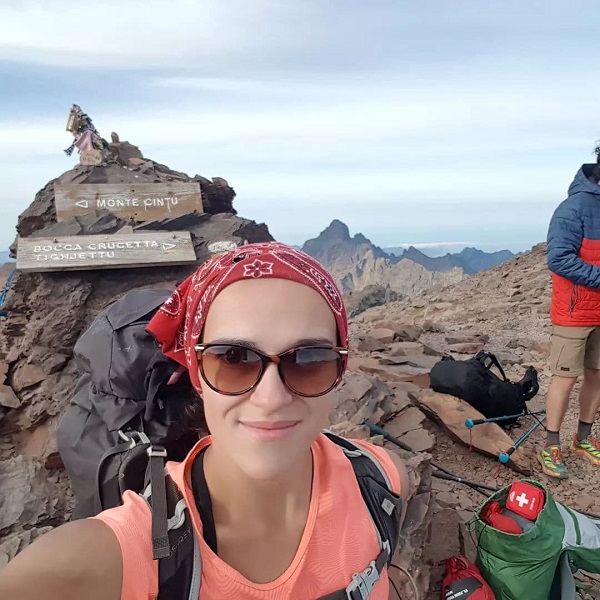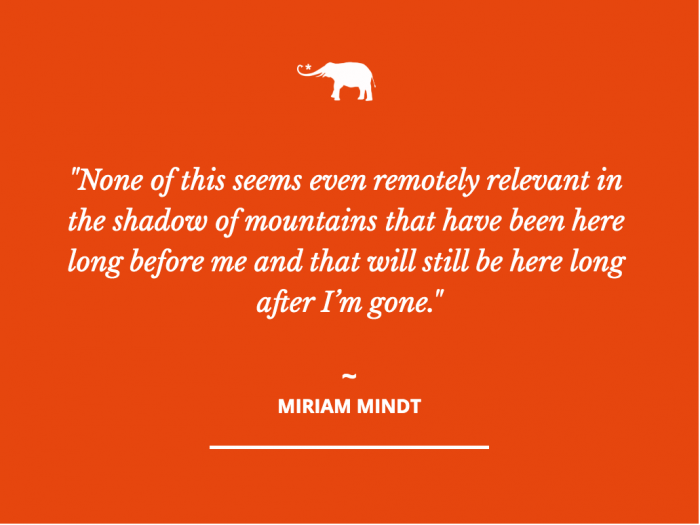
The Soothing Inconsequentiality of Being Myself in the Mountains (or anywhere, really).
This is for my saints, sinners, and in-betweeners.
This is for those struggling to strike a balance between being and becoming.
This is for my friend who taught me the value of taking breaks and who gave me space in more than one way, who left me to my own devices when that was all there was left to do, and who made sure I wasn’t alone in a thunderstorm on a mountain, in the dawning darkness, or in the recesses of my mind.
This is for my loyal body in its resilience, joy, adaptability in spite of every judgement, every action, every ounce of mistrust I’ve ever thrown its way, and for everyone who grants love without judgement over pity, who values their own resources first, and who doesn’t overextend themselves to rush to impotent ambitions of helping.
Humans are to be found in strange places, for they are weird and wild, wondrous and adventurous (and sometimes a little bit foolish or even stupid), but that’s mostly the same thing.
I have recently had the immense pleasure of hiking up and over most mountains of Corsica on the GR 20 with a dear friend—the kind I don’t need to talk to every day, or who I can go without seeing for two years (uhm, thanks, COVID-19) and still be aware of the value they have added to my life…and still do. The kind to have late-night kitchen conversations with, to unashamedly tell my less spectacular but sadder secrets to and know that it doesn’t matter which one of us would show up unannounced at an untimely hour of need at the other’s doorstep, said door would be opened wide, the kettle would be boiled, and no questions would be asked that aren’t ready to be answered.
There is excitement and stress and anticipation and joy (and stress again) to be found in prepping for a hike.
At the time of writing, I am painfully aware that this is what humans and other living beings might do with hugs and kisses and hands held and attention given and space held between two ears and in the warm shelter of an undeterrable pumping vessel in another’s rib cage—with mountains scaled together in post-coffee morning silence, interrupted by non-consequential, humorous utterings about the quality of the trail.
To manifold is the way to express and experience love that even the sweetest of words could never grasp them all. Sometimes it’s forgiveness exhaled on a downhill; sometimes it’s letting go of a fight against oneself or another; sometimes it’s filtered water or instant noodles shared; sometimes it’s a helping hand when needed or a silence in which to walk almost alone; a lot of the time, at its root, it seems to be remembering how we are but inconsequential accumulations of stardust.
The summit is just around the next corner, but it might take us a moment to get there because we’re really, really not that big.
So on the GR 20, even if the mountains weren’t the biggest of their kind, the island not so vast, and we were never far from civilisation, the sky and the air and the miles covered on foot were soothing in a profound way: the way in which they reminded me of how tiny I am and how I may be lucky to be but five-foot something, so I can stretch my body in the most ridiculously small-tent pitch, yet how there really isn’t any necessity for me to be making myself so small to fit in.
I remember how I promised myself a few years ago on the Camino de Santiago that I would do at least one long-distance hike every year, for the speed of thought when hiking is ideal: the forward motion is just enough to keep the thoughts moving. It is fast enough to have them discover new spaces instead of spiralling helplessly in self-doubt and stagnation, yet not so exhaustingly fast that thinking becomes impossible—an afterthought to gasping for air.
Life took some time, some turns, and while I didn’t make one long-distance hike per year, I was glad to be back. Okay, no, that is not quite true: it took me a good five days before I was glad to be back outside hiking.
For almost the entire first half of the trail, I wanted to quit, to run away from the discomfort, from my own lack of fitness, and perceived value to our mission of two from the heaviness of my pack and from the commitment to finish another thing that would take so long and would, at times, be as unenjoyable as being myself. Thanks to my resilient companion, I was reminded not to quit on a bad day, and so I didn’t quit on any of the bad days, and soon enough, good days came.
When you walk into a storm, don’t walk alone—otherwise you might miss out on cheerful conversations such as this one, “Uh-oh, I really hope the thunder stays over there and that there’s no lightning.” “Well, if the lightning’s coming out of this cloud, we’re f*cked anyway—we’re in it.” “Wow, that’s got to be the least reassuring thing anyone’s said to me in a long while!”
In the first days, the breathlessness of walking up mountains and inhibiting conversations made me uneasy. It left me alone in my crippling self-doubt and my hurtful memories that equated self-worth to physical or mental performance. It confronted me with the ubiquitous idea that unless I could go further and faster, unless I could brave the cold, the rain, and the oftentimes poor trail conditions with a smile and a helpful attitude, I wasn’t worth sh*t as a human being.
Soon enough, it reminded me of my childhood when my father pushed me to keep going up and over on a mountainside, not allowing me to sit. Up until a few weeks ago on the GR 20, it had never occurred to me that my parents could have simply said, “Okay, if you don’t feel up for it, you are crying, and you are in pain, we won’t go up that mountain today. You don’t have to. We love you. We love you even if you don’t climb that mountain.” Or, even more radical, “You are deserving of love, regardless of whether you climb mountains—regardless of whether you are capable of doing so, and regardless of whether you want to!”
Mountains are really quite impartial to whether we walk up and over them or don’t, just as they are to trees growing out the side of them. It is still impressive that trees (and we) do it anyway.
I wondered if that was true. And so, on the first half day of hiking the GR 20 out of Conca and up to Paliri, I walked through the rain crying for myself—for the child who had been taught she had no worth unless she performed.
I cried for having believed what I had been taught, and for how hard it was, even now, to let go of that belief. I cried for my parents who must have held that belief close to their hearts for them to pass it on to their only daughter. I cried for my partners and friends who had held the same belief, who had put so much pressure on themselves that sometimes, they went past breaking point.
I cried and I walked and I felt lousy, feeling so sorry for myself and like a failure, slowing down my hiking buddy, and so I tried to get rid of them, tried to send them ahead. I said that I understood if they didn’t want to stick with me and that I would be okay out here by myself. They said they knew, but that they didn’t want to leave me alone in the falling dark. I said I didn’t know how to accept that, how to deal with their sticking around, what to do with it.
It felt unfamiliar, uncomfortable. They looked at me, deadpan, “Alright. F*ck you then,” they said. Their head tilted, not quite sure whether leaving was the best course of action. It felt uncomfortable—the swearing, the threat of being abandoned. I didn’t particularly like the jab. It didn’t feel nice, but it felt familiar. I voiced that, “See, I don’t like it. But at least I know what to do with this.”
We carried on walking in silence together. They didn’t leave. I coped with them seeing me weak, fragile, sad, self-doubting, and walking at the staggering pace of something around 0.8 km per hour, heavy pack on my back, getting drenched. I coped with not performing to my standard, allowing a witness—a witness who may have outperformed me, yet did not kill me (not through physical superiority, mental resilience, pity, or kindness).
I didn’t realise at first that on the GR 20, no wild camping is allowed. We weren’t allowed to escape civilisation but rather encouraged to stay near, pay for refuges and shelters that offered water, gas, basic sanitary installations, and the company of people—wanted or not.
When on the second night my stove broke, I was grateful for the gas supply at the refuges. It allowed us warm porridge in the morning, shared coffee before a long ascent, and hot water in the evenings.
The first days were hard. I didn’t take breaks; I never learned how to or what for. I remembered being a child, finishing all my homework before taking even a bite of lunch every day. I realised that I had no idea when I needed to take a break. I only noticed having passed the moment when a couple hours later, I would become increasingly irritated, foggy-brained, unable to keep going, and would crash for the day.
My friend taught me the value of snacks and lunch breaks—another thing that was hard thanks to years of disordered eating. Relearning my body’s cues is hard. Noticing needs and limitations before it’s too late takes practice, and so I was glad to tag along, to rest when my friend rested, to have lunch and notice whether I was hungry or not, to begin noticing the subtle differences between my physiologies and needs.
Once we introduced lunch breaks and I had a few days to get trail legs, I rediscovered my body’s insane ability to just keep going. I remembered that it was both special and not special at all. It wasn’t special, because like any other body, mine needed breaks and food, and it liked being eased into things much more than having to walk 20 miles through the mountains on day one. It was special because within a matter of days, my body would adapt to new circumstances and excel.
As my friend fell ill with a monster head cold, I suddenly discovered that I could still keep going. I could just walk and walk and walk and have a short lunch break and then keep walking. And so we did. We walked. We walked through rain and thunderstorms and over mountains, and we walked long hours and made fun of what at times was barely a trail, and we made fun of life in the city and life in general, and we marvelled at the absurdity of it all. And then my friend said, “It still amazes me every time I’m in the mountains to see how small we are.”
So small and insignificant, I thought. What a relief. What a relief not to be important.
So small yet so determined and resilient, they said. Never mind some stardust on a mountain.
We are tiny, yet we scale mountains that are infinitely larger than we are. Undeterrable. Ambitious. For no apparent reason but to see further, to be closer to the sky full of clouds, or stars, or sheer beauty. And when confronted with the vastness of the mountains, when slipping out of my sleeping bag and stepping out of my tent into the ice-cold air in the middle of the night only to be greeted by a myriad of stars, it seems so silly that it would ever seem I had to make myself small.
When I woke in the morning simply to walk up another mountain, to walk all day with a pack on my shoulders, there suddenly was no need to be shy or ashamed about voicing my needs. There was no more reason to allow others to shut me up in relationships, family dynamics, or the hierarchies of the professional world.
None of this seems even remotely relevant in the shadow of mountains that have been here long before me and that will still be here long after I’m gone. It is absurd, in those moments, to think how I could be held captive by a toxic relationship or how it would ever occur to me to judge my body by the size of its waist, or breasts, the cleanness of its skin, or the circumference of its thighs.
How could I judge the vehicle that allows me to travel mountains on nothing but my feet in terms of superficial beauty defined by a consumerist, capitalist society? How did it ever occur to me to judge the vessel that allows me to hold fresh mountain air in my lungs by a standard so artificial, so far removed from my own visceral truth?
How can I turn against a body that will carry me and everything I need to keep me alive through the mountains, a body so adaptable that it remembers how to walk for 10 hours a day within a few days of hiking, a body I could train to run on trails and that has carried me on my hands, on my feet, for so long? How can it seem, at times, so hard to trust it and give myself over?
Mountains help put things into perspective.
I am grateful that for a short, brutal, sweet escape to this mountainous trail, I remembered the irrelevance of our day-to-day struggles and the liberating inconsequentiality of my own being. I am grateful I got to enjoy the company of my dear friend, Bird, the enriching discussions shared with them, and the moments spent on trail together.
I am grateful for every moment I remember that I’m nothing but stardust. It grants me so much freedom: to just be—instead of burning out, rushing to be who I thought I had to be.
















Read 0 comments and reply